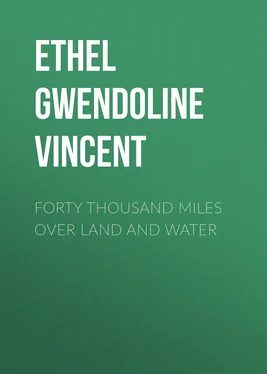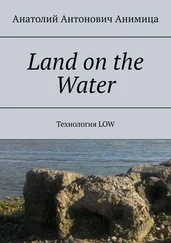Ethel Vincent - Forty Thousand Miles Over Land and Water
Здесь есть возможность читать онлайн «Ethel Vincent - Forty Thousand Miles Over Land and Water» — ознакомительный отрывок электронной книги совершенно бесплатно, а после прочтения отрывка купить полную версию. В некоторых случаях можно слушать аудио, скачать через торрент в формате fb2 и присутствует краткое содержание. Жанр: Путешествия и география, foreign_antique, foreign_prose, на английском языке. Описание произведения, (предисловие) а так же отзывы посетителей доступны на портале библиотеки ЛибКат.
- Название:Forty Thousand Miles Over Land and Water
- Автор:
- Жанр:
- Год:неизвестен
- ISBN:нет данных
- Рейтинг книги:3 / 5. Голосов: 1
-
Избранное:Добавить в избранное
- Отзывы:
-
Ваша оценка:
- 60
- 1
- 2
- 3
- 4
- 5
Forty Thousand Miles Over Land and Water: краткое содержание, описание и аннотация
Предлагаем к чтению аннотацию, описание, краткое содержание или предисловие (зависит от того, что написал сам автор книги «Forty Thousand Miles Over Land and Water»). Если вы не нашли необходимую информацию о книге — напишите в комментариях, мы постараемся отыскать её.
Forty Thousand Miles Over Land and Water — читать онлайн ознакомительный отрывок
Ниже представлен текст книги, разбитый по страницам. Система сохранения места последней прочитанной страницы, позволяет с удобством читать онлайн бесплатно книгу «Forty Thousand Miles Over Land and Water», без необходимости каждый раз заново искать на чём Вы остановились. Поставьте закладку, и сможете в любой момент перейти на страницу, на которой закончили чтение.
Интервал:
Закладка:
"The head of it rises ever and anon out of that cauldron below, but the cauldron itself will be invisible. It is ever so far down—far as your own imagination can sink it. But your eyes will rest full upon the curve of the waters. The shape you will be looking at is that of a horse-shoe, but of a horse-shoe miraculously deep from toe to heel; and this depth becomes greater as you sit there. That which at first was only great and beautiful, becomes gigantic and sublime till the mind is at a loss to find an epithet for its own use. To realize Niagara, you must sit there till you see nothing else than that which you have come to see. You will hear nothing else, and think of nothing else. At length you will be at one with the tumbling river before you. You will find yourself among the waters as though you belonged to them. The cool liquid green will run through your veins, and the voice of the cataract will be the expression of your own heart. You will fall as the bright waters fall, rushing down into your new world with no hesitation and with no dismay; and you will rise again as the spray rises, bright, beautiful, and pure. Then you will flow away in your course to the uncompassed, distant, and eternal ocean.
"Oh! my friend, let there be no one there to speak to thee then; no, not even a brother. As you stand there speak only to the waters!"
CHAPTER III
THE DOMINION OF CANADA
Since our arrival at Niagara we had been on Canadian soil, and in view of the falls, which form Canada's greatest glory; but our first experience of the Dominion only really commenced when we left Niagara Station by the Grand Trunk Railway for Toronto.
It may have been prejudice, but we thought that the country bore signs of greater prosperity than over the American border.
The farms are more English in character and the cattle in greater abundance. The soil looks richer, and the pretty wooden zigzag fences, which take the place of hedges or railings, look most picturesque. In many places the blackened stumps of trees showed the recent clearing by fire.
From Hamilton, a prosperous town, we ran for nearly forty miles along the shores of Lake Ontario to Toronto.
Toronto is the capital of the province of Ontario, the chief city of Upper Canada, and the Queen City of the West. There is jealous rivalry between Montreal and Toronto. The former has the shipping interest, and for a long time held the lead; but Toronto is quickly gaining ground, and is the centre for a rapidly increasing commercial interest. Five lines of railway converge to her termini.
Hamilton and London, both rising places, centralize their commerce here. Lake Ontario supplies water transit to Montreal and the ocean; and the numerous banks do a thriving trade. In 1871 the census of the population was 50,600; ten years later it was 80,445. Wide streets of great length, avenues of trees, and churches are the chief characteristics of Toronto. The churches are built from the voluntary subscriptions of the congregations, the pastors being chosen and maintained by them. There is no State Church, and the Dissenters have as fine places of worship as the Episcopal body. The Metropolitan Methodist Church, with almost cathedral proportions, was built by Mr. Puncheon, the American Spurgeon, and it compares as advantageously to the Tabernacle as do the Churches to the Chapels of England.
Toronto abounds in pretty suburbs, chief among them being Rosedale. The comfortable wooden houses of the upper and middle orders convey an idea of prosperity, with their neat gardens, a swinging hammock in the creeper-covered verandah, and the family sitting out in the cool of the evening.
The Provincial Parliament is a dingy building; but Osgood Hall—or the Law Courts—opened in 1860 by the Prince of Wales, and called after the Chief Justice of that day, is a very fine stone edifice, complete in all its arrangements. There are full-length portraits of the Chief Justices in succession, which being continued, will form a very complete legal gallery of local talent. There are fourteen judges, receiving 5000 dollars a year, nominated by the Governor-General from local men. The bar and solicitors are united as in America, and work together in firms, and are both eligible for judicial preferment, and have a like right of audience.
The Toronto University is second only to Harvard on the American Continent. The lecture-rooms, hall, museum, and library are all worthy of the fine Gothic building. There are 600 students, many of whose families coming to reside in Toronto, add much to the pleasantness of society. We stayed three days at Toronto. Mr. Hodgins, Q.C., Master in Chancery, was most kind in introducing my husband to some of the chief political men—to Mr. Mackenzie, the late Liberal Premier; Mr. Blake, the present leader of the Opposition; Mr. Ross, the Minister of Public Education, and others. The latter Minister showed us over the Normal School for the Instruction of Teachers. It has a well-arranged library and museum, and copies of many works of the old masters, and busts of the principal men in British history. Toronto is considered the most English of all the Canadian towns, and the Torontans pride themselves on this, and take a keen interest in home affairs. The previous night's debate in Parliament is on the breakfast-table: cabled over, and aided by the five hours' difference between the time of Greenwich and that of the Dominion, it appears in the first edition.
We dined with Mr. Goldwin Smith, the distinguished Oxford Professor of History, who, after a long sojourn in the United States and Canada, has settled with his wife at Toronto. Their house is delightfully old-fashioned. Though in the centre of the town, the garden and some of the original forest trees are still preserved to it; and it contains the tail-end of family collections, valuable bits of China, busts by Canova and Thorwaldsen, ivory carvings, morsels of jade, and some relics of the first settlers. Amongst the latter are some wine-glasses belonging to General Simcoe, the first Governor-General in 1794, which are without feet,—"To be returned when empty."
Wednesday, July 23rd. —We left Toronto in the afternoon by the steamer Algeria , coasting along the low-lying country of the left bank of Lake Ontario. Touching at the various thriving towns, we judged by the crowd who came down to the pier that it was the usual thing for the population to stroll down in the evening and watch for the arrival of the steamer.
All night we were crossing Lake Ontario, and at four o'clock the next morning, in the grey dawn, touched at Kingston. We waited here an hour for daylight, in which to approach the Thousand Islands. As we passed out we saw the gilt dome of the famous Military College.
In the freshness of the early morning, with the sun just flushing the waters and warming into life the bare and purple rocks, we wound in and out of the narrow channel of the Thousand Islands. It is the largest collective number of islands in the world. Some are formed of a few bare rocks just appearing on the surface of the water, others are large enough for a villa, a garden, and a boat-house, and others again for farming purposes. Their uniform flatness causes some disappointment and mars their collective beauty, though here and there one may be singled out for the prettiness of its woods.
At Alexandra Bay, a familiar summer resort, with two monster hotels, the St. Lawrence opens away from the lake, and we are descending between its monotonous banks for some hours.
The increasing swiftness of the current and the prevailing thrill of excitement of all on board, warns us of the approach of the Long Sault Rapids. We see a stormy sea, heaving and surging in huge billows.
All steam is shut off, four men are required at the wheel to keep the vessel steady, as we "shoot the rapid." One minute we are engulfed; the next rising on the crest of the wave. Intense and breathless excitement is combined with the exhilaration of being carried in a few minutes down the nine miles of descent. Every now and again a peculiar motion is felt, as if the ship was settling down, as she glides from one ledge of rock to another.
Читать дальшеИнтервал:
Закладка:
Похожие книги на «Forty Thousand Miles Over Land and Water»
Представляем Вашему вниманию похожие книги на «Forty Thousand Miles Over Land and Water» списком для выбора. Мы отобрали схожую по названию и смыслу литературу в надежде предоставить читателям больше вариантов отыскать новые, интересные, ещё непрочитанные произведения.
Обсуждение, отзывы о книге «Forty Thousand Miles Over Land and Water» и просто собственные мнения читателей. Оставьте ваши комментарии, напишите, что Вы думаете о произведении, его смысле или главных героях. Укажите что конкретно понравилось, а что нет, и почему Вы так считаете.












